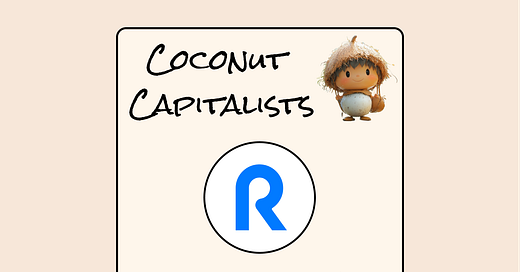China's 2nd Richest Man Blasts ByteDance & PDD; Diving into Asia's Reka AI
November Week 3: Nov 19 - Nov 25
In today’s edition:
China’s second-richest man publicly blasts ByteDance & Pinduoduo
Anthropic & Snowflake are new friends, and the scoop with Reka AI
Taking on Mark Zuckerberg is China’s AR startup built on Alibaba’s LLMs
More Asia Startup News
🔥 China’s second-richest man publicly blasts ByteDance & Pinduoduo
The scoop: China's Zhong Shanshan, whose net worth exceeds $60 billion USD, delivered a scathing critique of two Chinese tech giants during an event near Shenzhen. He first accused Pinduoduo of price manipulation and claimed that they were destroying local mom & pop merchants. Second, he launched a particularly harsh tale of how ByteDance allegedly orchestrated a misinformation campaign against his company.
Zhong went on to demand an apology from ByteDance's founder over what he claims was a coordinated effort by online trolls to create artificial narratives such as his company’s water contains large amounts of lead (which can be deadly to humans) and also that his company had moved their HQ to the Cayman Islands to evade taxes.
The impact has been substantial: Nongfu's shares have declined sharply, erasing more than $20 billion USD in market value since January 2024. This decline cost Zhong his position as China's wealthiest individual in August.
Fun facts:
If you're not up to speed with Zhong, his fortune derives primarily from two holdings: an 84.5% stake in Nongfu Spring, China's dominant bottled water company, and a 73% stake in Beijing Wantai Biological Pharmacy Enterprise, which produces vaccines and hepatitis test kits.
Chinese media has long dubbed Zhong the "Lone Wolf" for his independent business approach and tendency to avoid the spotlight. This is a rare occasion for him to speak publicly, and even more so in a negative fashion.
In addition to the stock price, the controversy has materially affected Nongfu Spring's business - the Hangzhou-based company reported an 18% decline in bottled water revenue to $1.18 billion USD in the first half of 2024.
Why it matters: Public criticism from China's business elite toward the domestic business sector is exceptionally rare. The last notable instance was Jack Ma's critique of Chinese financial regulations (which occurred just days before the $300 billion USD Ant Group anticipated IPO, which was halted in the following week).
This led to his lengthy public absence (during which much of Western media questioned if Jack Ma was even still alive) until his eventual reappearance at a Brooklyn Nets game in Paris. After this critique of regulators, the previously outspoken businessman has maintained a noticeably lower profile.
💪 Anthropic & Snowflake are new friends, and the scoop with Reka AI
The scoop: Snowflake and Anthropic have formed a multi-year partnership to develop AI applications together, integrating Anthropic's Claude 3.5 model with Snowflake's Data Warehouse product. Spokespeople for both parties stated that the collaboration will improve productivity for Snowflake's 10,000+ enterprise customers.
This partnership marks a strategic shift for Snowflake. Just four months ago, the company was reportedly close to acquiring Singapore's Reka AI for $1 billion USD, a startup founded by former Google DeepMind researchers (who are originally from Indonesia, Hong Kong, & Singapore).
The potential deal followed Snowflake's acquisition of AI search company Neeva and suggested a "buy vs build" approach to expanding its AI capabilities. While the reasons why the acquisition didn’t materialize remain unclear, Snowflake has pivoted to a partnership-driven strategy as their backup plan, as shown by the Anthropic deal.
Fun facts:
Reka AI has built one of the industry's most comprehensive suites of multimodal AI models: Reka Core (67B parameters), Flash (21B), Edge (7B), and Spark (2B). These models can process text, code, images, video, and audio data
The startup raised $58 million USD in 2023 from investors including DST Global Partners and Radical Ventures
According to LinkedIn, the company has 22 employees with offices/team members based in California, Singapore, Hong Kong, and even Zurich
Why it matters: Asia-based foundation model companies like Reka AI, Sakana AI, and Sarvam AI face an increasingly competitive landscape for major partnerships, competing directly with established players like OpenAI and Anthropic.
However, so far, they've been able to compete against these heavyweights with great success by focusing on their regional strengths - Reka AI, for instance, has secured strategic partnerships with Telkom Indonesia and Alibaba Cloud. Their ability to continue winning significant deals while competing with Western AI companies will be crucial for their growth, and they're off to a great start!
🧠 Taking on Mark Zuckerberg is China’s AR startup built on Alibaba’s LLMs
The scoop: China-based Rokid recently launched its latest AI Augmented Reality smart glasses, alongside a unique integration with Alibaba's Qwen family of language models. Unlike Meta's recently demonstrated Orion glasses (which if you haven't seen yet - there are tons of YouTube videos), Orion remains years away from a consumer release. Instead, Rokid's product is market-ready & you can immediately purchase on their website. However, from a product design standpoint, there's still room for refinement in the aesthetic department. The look & style is more similar to Snapchat Spectacles or Google Glass versus the Ray-Ban Meta Smart Glasses.
The team:
The CEO is a computer science PhD from the University of California, Berkeley
The CTO was previously a VP of Engineering for Alibaba's Research Team
The Chief Scientist previously led Samsung's Semiconductor Institute in China
Bull case: Rokid's first-mover advantage in integrating LLMs with AR creates a compelling market position. And their flagship Rokid Max delivers 1920x1080 resolution per eye at $439, which is reasonable in comparison to mixed reality competitors such as Apple Vision Pro at $3,499 or the Meta Quest Pro $3,499 (obviously these are quite different products, but it's the best comparison we've got in Augmented Reality land - haha)
Bear case: Rokid faces significant competition from tech giants with vastly superior resources. Meta's Reality Labs division spends $10 billion annually on R&D, while Apple has committed $15 billion yearly to AR/VR development. The latter's Vision Pro, launching in early 2024, sets new standards with 4K resolution per eye and advanced spatial computing capabilities.
Rokid's $20 million funding is insignificant against these investments. The AR market remains niche, with just 2.4 million global shipments in 2022. If market growth disappoints, hardware-dependent companies like Rokid could struggle to survive.
The democratization of AI models and AR development tools could enable well-capitalized Chinese tech companies to enter the market. ByteDance's Pico headsets already control 20% of China's XR market, leveraging TikTok's massive distribution network. This competitive pressure could force Rokid to choose between costly innovation or margin-eroding price cuts.
🇯🇵 Japan NewsThe Japanese government is taking on the role of a late-stage venture capital firm. The Department of Economy, Trade, and Industry (METI) is committing $1.28 billion to semiconductor startup Rapidus, to be wired in April 2025.
🇨🇳 China NewsBaidu has achieved a remarkable manufacturing milestone with its latest autonomous vehicle (called Apollo RT6), with production costs down to only $34,000 per unit. This stands in sharp contrast to America's Waymo vehicles, which were estimated to cost $180,000 each as of January 2021.
🇸🇬 Singapore NewsFTX co-founder Gary Wang (who has recently been in hot water with both Singapore & the US) was awarded zero prison time after providing extensive cooperation in the case against Sam Bankman-Fried. Wang's testimony proved crucial in securing Bankman-Fried's conviction and 25-year sentence.
🇮🇱 Israel NewsLightricks has open-sourced its LTX-Video Generation Model, breaking new ground in real-time video generation. Listen to this: The system can generate 5-second videos in just 4 seconds at 24 FPS and 768x512 resolution, while solving painful challenges like frame inconsistency and flickering. The technology's speed is a breakthrough for interactive media - imagine Fortnite generating adaptive cutscenes based on player actions without pre-rendering.
🇰🇷 Korea NewsNaver Pay partnered with blockchain firm Hashed to implement NFT-based ticketing at its DAN24 technology conference, successfully processing nearly 9,000 transactions for over 20,000 digital tickets. The successful deployment marks a tangible step forward in blockchain ticketing, an often-discussed but rarely implemented use case that Naver appears to be seriously pursuing.
Bering Lab has achieved 99% accuracy in its AI-powered legal translation product by combining machine learning with a network of 500 lawyers and 800 translators across 30 countries. The company (backed by funds like SBVA & Naver's Startup Factory) has attracted over 300 global clients, including 140+ law firms, while reportedly maintaining a 90%+ solution repurchase rate.
UAROUND's photo & video AI content creation platform called Genbler (built for face swaps, background edits, image upscaling, etc.) earned Product Hunt's Product of the Day distinction shortly after its launch. If you're into startups, you'll know that Product Hunt is a critical distribution channel for new software.
Samsung introduced its Gauss2 LLM in three variants - Compact, Balanced, and Supreme. The AI Model supports 14 languages and processes requests 1.5-3x faster than leading open-source alternatives. Interesting news, as there were many rumors of an OpenAI & Samsung partnership. But unlike Apple, it seems that Samsung is taking the path of developing large language models in-house.










